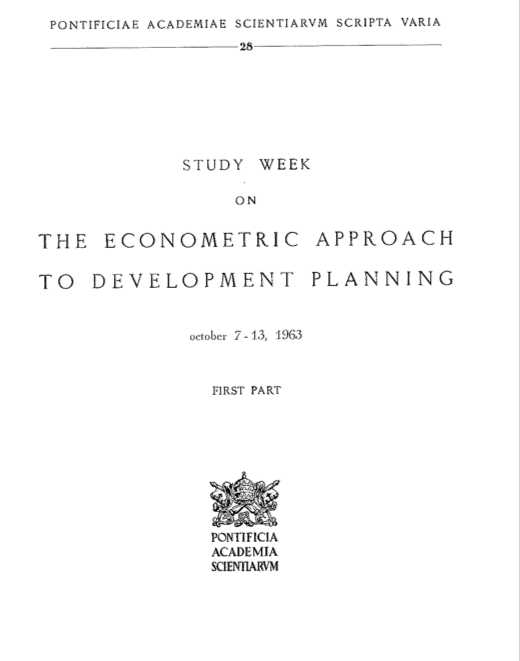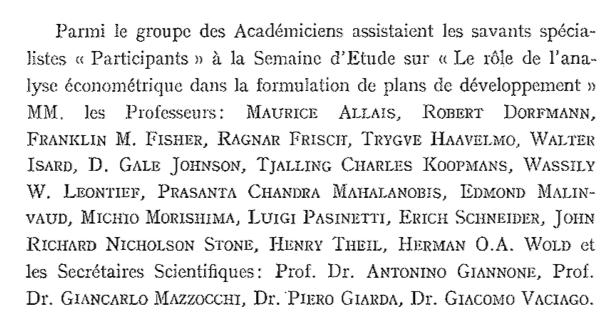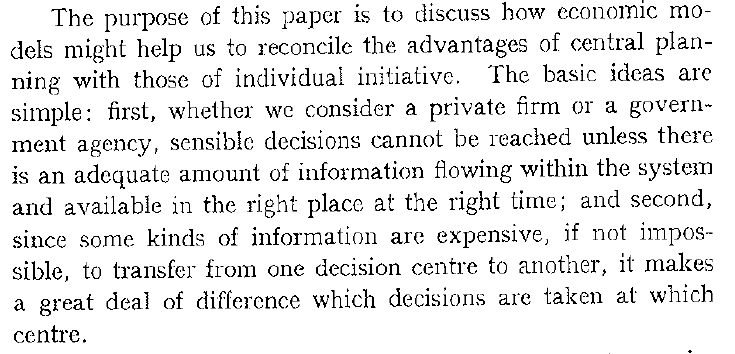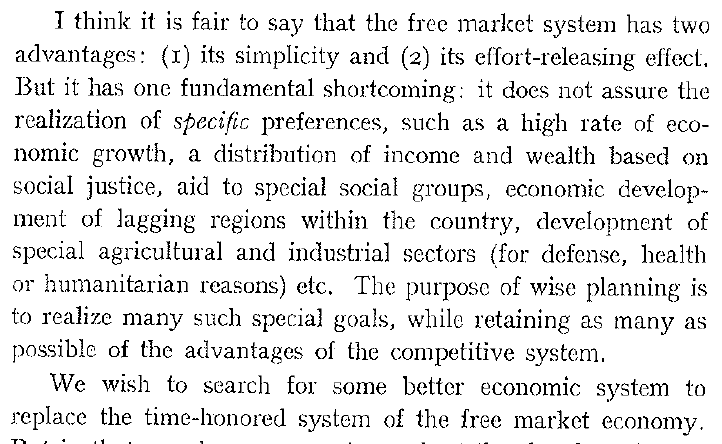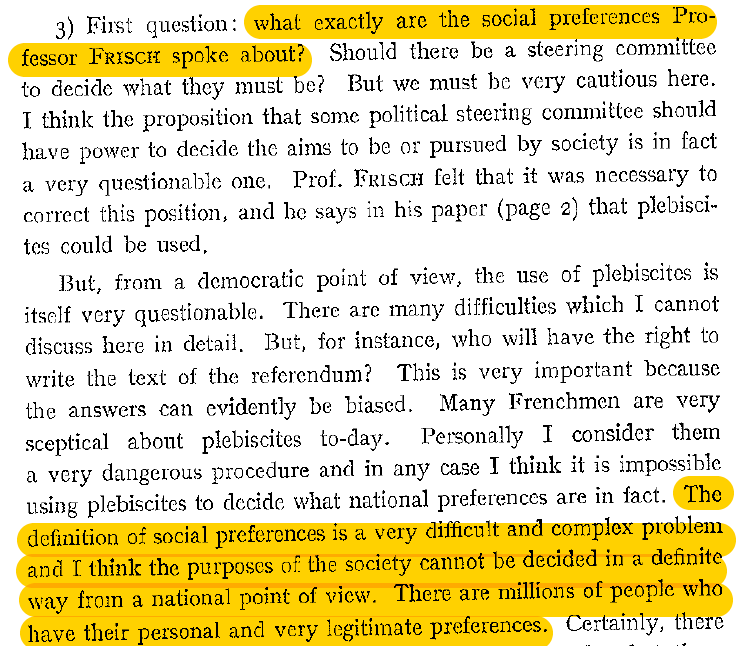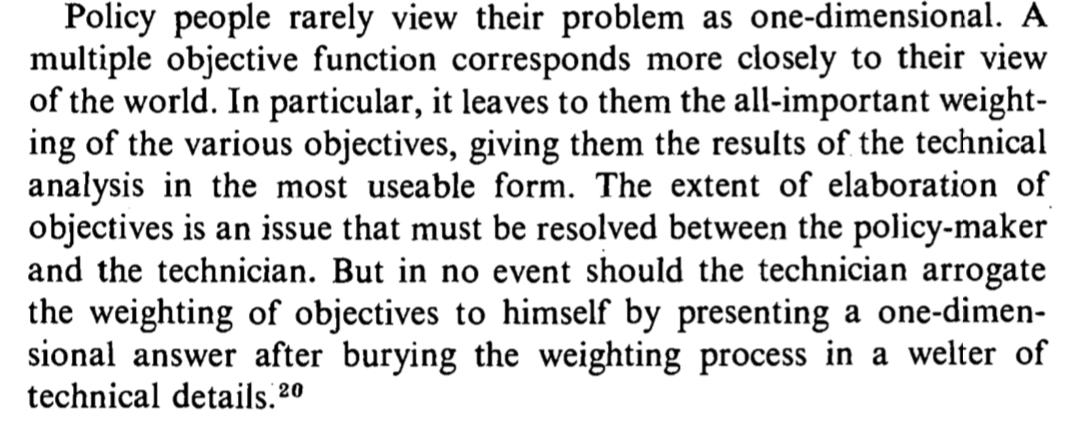1/ This quote is a 1963 collective statement by 18 economists concluding a week-length discussion of econometrics in Vatican at the request of the Pontifical Academy Science, a story told in a fascinating paper by Ariane Dupont-Kieffer here https://read.dukeupress.edu/hope/article-abstract/51/3/515/137811/The-Vatican-Conferences-of-October-7-13">https://read.dukeupress.edu/hope/arti... https://twitter.com/Undercoverhist/status/1178053824625463297">https://twitter.com/Undercove...
2/ it’s fascinating case study, b/c papers & debate minutes b/w 1960s foremost econometricians have been preserved ( http://www.casinapioiv.va/content/dam/accademia/pdf/sv28apas.pdf">https://www.casinapioiv.va/content/d... & http://www.casinapioiv.va/content/dam/accademia/pdf/sv28bpas.pdf">https://www.casinapioiv.va/content/d... ), also b/c normative framing of Pontifical invitation forced them to argue over neutrality of econometric models
3/ P. Salviucci, Pontifical Academy chancellor, kicked week noting “the free play of individual choice does not guarantee, as used to be thought, favorable results for the community” Tensions b/w market & planning,also advocacy & objectivity, as per Furner, was one much discussed
4/ Opening & concluding keynotes, by growth applied econ Richard Stone & Econometric Society founder Ragnar Frisch, both emphasizes limits of free-market & uses of econometric models to guide intervention. Stone opened conference by stating that “it has long been commonplace...
that economy is an exceedingly complex probabilistic system. According to classical theory... system is efficient, stable & progressive…but imperfections of laissez faire are so glaring…so angry have men been at abuses, injustices & waste of resources around them (1963, folks)
6/Stone believes that econometric models “might help us reconcile advantages of central planning with those of individual initiative,” & outlined his dual model of growth in which econometricians identify a long-term steady state then a path toward it through transient states
7/Frisch echoed Stone: “free-market system does not assure the realization of specific preferences, such as distribution of income & wealth based on social justice…purpose of wise planning is to realize many such special goals, while retaining advantages of competitive system”
8/argued only planning could propose the right set of incentives for econ agents. ‘Samuelson-Solow menu’ (Phillips curve) fell prey of ‘financialism,’ mixed systems were inconsistent & Soviet Union was failing (he said in 1963). Econometricians could devise better decision models
9/ these statements made other econs uneasy. In response to Stone, statistican Herman Wold outlined 3 aspiration levels for modellers: finding, understanding, predicting (the latter for mature science, like meteorology. Econ stood in between history and meteorology, he reflected)
10/ Wold also cautiously endorsed “policy” or “decisional” models, “where value judgments underlying alternative political actions are included as specified hypotheses which in themselves are politically neutral.” French econ Allais was much more worried:
11/ "the model is neutral if it aims to describe & explains the facts…not if intended to act on the facts,” Allais told Stone & Wold. After Frisch’s concluding keynote, Allais provided a lengthy rebuttal, Dupont explains. “Personally I would say that I am a neoliberal but...
I think political views should remain outside the technical discussion…Econometrics is a powerful tool of analysis but nothing more.”
Allais was skeptical that “millions of people who have their personal & very legitimate preferences” can be aggregated into “social preferences”
Allais was skeptical that “millions of people who have their personal & very legitimate preferences” can be aggregated into “social preferences”
(Social justice? Go home Ragnar, you’re naïve)
13/ Hence the circumvolved collective collective quote which opened the thread: "we have no effective way of determining how community tries to reconcile 2 competing goals." More research was needed, they agreed
13/ Hence the circumvolved collective collective quote which opened the thread: "we have no effective way of determining how community tries to reconcile 2 competing goals." More research was needed, they agreed
14/ Econometricians were not alone in obsessing over social objectives embedded in models. As JB Fleury & I explain https://www.springerprofessional.de/en/economists-interest-in-collective-decision-after-world-war-ii-a-/12067650,">https://www.springerprofessional.de/en/econom... social, public choice, public & urban econs constantly argued in the 1960s (below, introduction of first book titled Public Econ, 1969)
15/As detailed by Banzhaf https://www.jstor.org/stable/27647862 ,">https://www.jstor.org/stable/27... environmental econs & all those using cost-benefit analysis scratched their head over the sets of weights to use. “In no event should the technician arrogate the weighting of objectives to himself," Eckstein warned in 1961
16/Question is whether economists have since ceased to ask “whose values” are embedded in their models (& why), or whether those discussions have taken new forms (like Taylor rule or Central bank mandate in macro, for instance), or whether value questions are still there, looming

 Read on Twitter
Read on Twitter